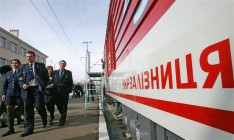Business
insuranceA leader of the voluntary medical insurance market is presaged a lethal outcome

Naftogazstrakh, the leader of the market of voluntary medical insurance (VMI) in Ukraine, may shut down its business by the end of this year in connection with the loss of its strategic partner Ukrzaliznytsia (Ukrainian Railway), three sources on the insurance market simultaneously informed Capital. The press service of Naftogazstrakh did not respond to the inquiry of Capital. Deputy General Director of the company Volodymyr Zeleniy, who manages VMI, refused to comment on the situation.
All in one basket
Naftgazstrakh has been the leader on the VMI market of Ukraine since 2011. Last year, the company received UAH 268 mn in premiums and in the first half of 2014 this figure already reached UAH 192 mn. Compared to the same period in 2013 the increase in premiums was nearly 55% of that amount. Over six months of this year the insurer paid UAH 106.3.
Cooperation with the state-run monopoly Ukrzaliznytsia, to whom the insurer sold medical insurance policies to its employees since 2007, helped the company achieve such results. “Over seven months Naftogazstrakh developed insurance programs for the railway system employees, which cover high-tech and cost-intensive methods of rendering medical aid,” it is written in the information released by the company’s press service.
The new management of Ukrzaliznytsia did not appreciate such efforts and in the summer of 2014 it announced a change in its insurance partners. Specifically, starting from August employees of the Odesa Railway under the VMI program will be insured by Inter-Polis company affiliated with Ukrzaliznytsia. Experts of the insurance sector believe that by the end of this year the insurer will sell VMI policies to all employees of the railway system of Ukraine and thereby squeeze out competitors from the insurance market. “I believe that in connection with this Naftogazstrakh will fold its business. The fact is that VMI accounts for more than 90% of the portfolio of this company and only one partner – Ukrzaliznytsia – accounted for the lion’s share of the company’s business,” says General Director of the Insurance Business Association Lyudmyla Beloshytska.
Chairman of the Insurance Commission of the Ukrainian Financial Analysts Society Vyacheslav Chernyakhovskiy is of the same opinion. “By the end of the year there will be a change in the leaders of the medical insurance market. Naftogazstrakh may be replaced by Uniqa, which today is seeing an active growth in premiums,” he forecasts.
Industry experts blame the insurer for this outcome seeing as it erroneously builds its business on one form of insurance and on one strategic partner. “This company had a chance to develop another sphere of insurance, but it did not take advantage of it,” say Beloshytska. The issue here is about auto insurance. In May 2013 Naftogazstrakh became a member of the Motor Transport Insurance Bureau of Ukraine (MTIBU). But a year later in April 2014 it was kicked out of the bureau. The ground for stripping Naftogazstrakh of its membership in the MTIBU was its debt on payment of guaranteed contributions to the fund for the protection of victims of accidents. “This was dictated by clear intentions to concentrate on further improvement of the technology and programs of medical insurance,” General Director of Naftogazstrakh Anton Kiyashko commented on the exit from the MTIBU.
Short-run game
Now, Naftogazstrakh will most likely be forced to develop other forms of insurance. “But even if the insurer folds its business, clients will not suffer as the system of corporate VMI of Ukrzaliznytsia takes into account monthly payments and payouts. The company is liable to the client after receiving a premium for one month, not a year as is typical in the auto insurance business. For this reason, leaving the market the insurer will manage to fulfill its obligations,” former General Director of Naftogazstrakh Oleksandr Kapshuk is confident.
As for Inter-Polis, experts say if the company does not create its own VMI mechanism by the year’s end the employees of Ukrzaliznytsia may be left without medical insurance. “The corporate VMI is like a braid,” says Kapshuk. “In appearance it is an instrument, but only the skilled can braid it.”






 of the agreement of syndication with Financial Times Limited are strictly prohibited. Use of materials which refers to France-Presse, Reuters, Interfax-Ukraine, Ukrainian News, UNIAN agencies is strictly prohibited. Materials marked
of the agreement of syndication with Financial Times Limited are strictly prohibited. Use of materials which refers to France-Presse, Reuters, Interfax-Ukraine, Ukrainian News, UNIAN agencies is strictly prohibited. Materials marked  are published as advertisements.
are published as advertisements.